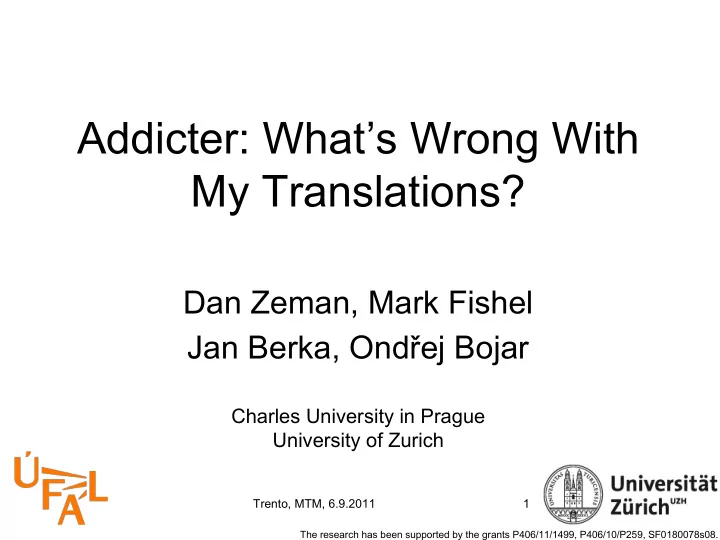

Addicter: What’s Wrong With My Translations? Dan Zeman, Mark Fishel Jan Berka, Ondřej Bojar Charles University in Prague University of Zurich Trento, MTM, 6.9.2011 1 The research has been supported by the grants P406/11/1499, P406/10/P259, SF0180078s08.
Visualizer and Error Labeler • ADDICTER = Automatic Detection and DIsplay of Common Translation ERrors • Error labeling part (Mark) • Visualizing part (Dan): View word-aligned corpora Look up corpus examples of a word Look up word occurrences in phrase table Alignment summary of a word Browse test data • In addition to the above, also shows auto-detected errors Trento, MTM, 6.9.2011 2
HTML Visualization • Cheap interface (from the developers point of view) • Displayed by your favorite browser • Words are clickable Links to their own examples • Alignments shown using tables Simple sentence pairs possibly better using graphics Complex reordering? Graphics not that good. Besides, it would be difficult to show in HTML. Trento, MTM, 6.9.2011 3
Screenshot Trento, MTM, 6.9.2011 4
You May Be Used to This… In the first round, half of the amount is planned to be spent. V prvním kole bude použita polovina částky. Trento, MTM, 6.9.2011 5
… or this … V prvním kole bude použita polovina částky. In the first round, half of the amount is planned to be Trento, MTM, 6.9.2011 6 spent.
Alignment Summary Trento, MTM, 6.9.2011 7
How to Use • Word occurrences are first indexed • Then a Perl script generates the HTML • Test data browsing: static HTML • Training data / word examples: dynamic only Do not pre-generate zillions of pages Drawback: web server + CGI needed Trento, MTM, 6.9.2011 8
Translation Error Analysis • Any Single-Number Metric may be good for… comparing two systems on given dataset tuning model weights (if easily computable) • Rarely, if at all… does the absolute value tell anything • BUT NEVER… points directly to the particular weaknesses of the system Trento, MTM, 6.9.2011 9
Error detection and labelling • src: per favore una pizza “ quattro stagioni “ . • ref: a “ four seasons “ pizza please . • hyp-1: one “ four seasons “ pie as a favor . • hyp-2: please , a pizza “ stage four “ . Trento, MTM, 6.9.2011 10
Error detection and labelling • Error taxonomy similar to Vilar et al. (2006) Inflection error / untranslated word Lexical choice error Missing (functional/content word) Superfluous Punctuation Misplaced word (locally/globally) Trento, MTM, 6.9.2011 11
Error detection and labelling • Works on word-level • Requires reference and hypothesis Can benefit from source text, lemmas&PoS-tags • Uses monolingual alignment Addicter's (...) or any other Requires injective (1-to-1) alignments Can find the “optimal injective subset” for non-injective alignments • Multiple errors per word allowed Trento, MTM, 6.9.2011 12
Addicter's alignment • Lightweight (no learning, no external resources) • Applied to lemmas (can be done with anything else) Only identical lemmas can be aligned • HMM-based “disambiguation” p trans (a n | a n - 1 ) ~ exp(-b * | a n – a n - 1 – 1 |) Stimulates to align similarly to previous alignment Exponential time, solved via beam-search Trento, MTM, 6.9.2011 13
Lexical errors • Errors are classified, using the alignments: • Unaligned = missing (in ref) / extra (in hyp) Classified into functional/content via pos-tags • Aligned: diff. word, same lemma = inflection error • Aligned: diff. word and lemma = lex. choice error • Any error on punctuation = punctuation error Trento, MTM, 6.9.2011 14
Order errors • To find these, alignment is “unscrambled” Find the minimum number of rearrangements to fix the order • Transposed adjacent elements = local reordering • Shifted elements = global reordering Trento, MTM, 6.9.2011 15
Evaluation • Data: wmt09 en-cz, 200 sentences * 4 systems Tagged manually with translation errors • Alignments: Addicter METEOR Bilingual (GIZA++, Berkeley) Via source (CzEng) • Evaluation: precision/recall of all error tags Trento, MTM, 6.9.2011 16
Results Trento, MTM, 6.9.2011 17
Results Trento, MTM, 6.9.2011 18
Experiment Results • Underaligned translations => miss/extra overkill • Dependence on a single reference is bad • Alignment and error detection quality do not correlate 1-to-1 alignment requirement to blame Have to go to phrase-/syntax-/etc.-based alignments Trento, MTM, 6.9.2011 19
Future (this week?) • Lots of improvements possible • Philipp-style corpus occurrences?, aka collocations • Index of lemmas Find all occurrences of a word regardless form • Perl-based web server? • Further integration between visualization and error analysis • Further testing of error analysis • Symbiosis with Hjerson Trento, MTM, 6.9.2011 20
Recommend
More recommend